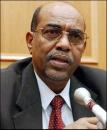Sudan president empowers tribal leaders to help disarm militia
 KHARTOUM, Sudan, Aug 13, 2004 (AP) — Sudanese President Omar el-Bashir has ordered tribal leaders to form security forces to disarm Arab militiamen blamed for killing 30,000 people in Darfur during an 18-month conflict.
KHARTOUM, Sudan, Aug 13, 2004 (AP) — Sudanese President Omar el-Bashir has ordered tribal leaders to form security forces to disarm Arab militiamen blamed for killing 30,000 people in Darfur during an 18-month conflict.
The decision, announced following two days of talks here between Sudanese officials and Darfur tribal chiefs, comes amid intense international and regional efforts to end the Darfur crisis, which has forced more than 1 million black Africans from their homes and left some 2.2 million in urgent need of food and other aid.
On Friday, the U.N.’s World Food Program said it had reached a deal with Darfur rebels to facilitate truck supplies carrying relief aid to Darfur areas under their control. This followed the arrival of the first WFP food shipment in Libya on Wednesday.
The U.N. describes the Darfur conflict as the world’s worst humanitarian crisis, while the European Union, U.S. and humanitarian groups accuse el-Bashir’s government of backing Arab militiamen, known as the Janjaweed, with vehicles, helicopters and airplanes -a claim Sudanese officials deny.
The U.S. Congress and some humanitarian groups also accuse the Sudanese government of genocide, claims which Sudan and the Arab League reject.
Darfur’s troubles stem from long-standing tensions between nomadic Arab tribes and African farming neighbors over dwindling water and agricultural land.
Those tensions exploded into violence in February 2003 when two African rebel groups, the Sudanese Liberation Army and the Justice and Equality Movement, took up arms over what they regard as unjust treatment by the government in their struggle with Arab countrymen.
Since then, the Janjaweed have rampaged through the region, torching villages, killing thousands of black Africans and driving many more from their homes.
On Thursday, the Sudanese government ordered some 100 tribes in Sudan ‘s three Darfur states to create their own security forces, including armed camel riders, to disarm the Janjaweed militias.
The Civil Administration of Darfur’s Grand States, which comprises the region’s tribes, was also ordered to work in conjunction with some 6,000 Sudanese police forces deployed to Darfur to disarm the Janjaweed, according to the communique issued Thursday following the two-day conference.
The communique said the Civil Administration would take charge of dealing with neighboring states “to hand in wanted outlawed persons to Sudanese authorities and control weapon smuggling across borders.”
It also urged tribal leaders to “re-establish social bonds” between Arab and African tribes and “grant financial compensation for those who hand in their weapons.”
On July 30, the U.N. Security Council gave Sudan 30 days to stem ethnic violence in Darfur or face economic or diplomatic penalties.
Sudanese officials and the Arab League, which Khartoum belongs to, have said the government needs more time to end the crisis and rejected the threat of U.N. penalties.
But el-Bashir’s government has agreed to comply with the resolution and this week signed an agreement with the U.N. to establish safe areas in Darfur in 30 days so civilians can search for food and water and work their land without fear of attack.
In Geneva, WFP spokeswoman Christiane Berthiaume said the U.N. has reached an agreement the Sudan Liberation Army and the Justice and Equality Movement in neighboring Eritrea regarding the passage of trucks carrying relief to displaced Sudanese people.
“They have assured us that our convoys won’t be subjected to bureaucratic and other delays,” Berthiaume said. Fighters who claimed to be rebels have held up and looted aid trucks in recent weeks, she noted.
Sudanese government and rebel officials have indicated they will attend a new round of peace talks set for Aug. 23 in Nigeria, Nigerian officials said this week. Nigerian President Olusegun Obasanjo is the current chairman of the African Union, which has sent a 300-strong force to monitor a barely respected April cease-fire.
Tanzania’s deputy foreign minister, Abdulkader Shareef, said Thursday his country plans to contribute troops to the AU force to protect military observers monitoring the cease-fire.
Shareef said Tanzania has not yet finalized the size of its troop deployment nor set a date for when they’ll be sent to Darfur.
Rwanda and Nigeria have also said they will contribute to the protection force. So far, 80 observers have been deployed to Darfur, and more than 150 Rwandan troops are due to arrive in the region Sunday.
The African Union is also considering sending a peacekeeping force of nearly 2,000 soldiers to Darfur. But the group has not yet reached an agreement with the Sudanese government on deploying the force.
